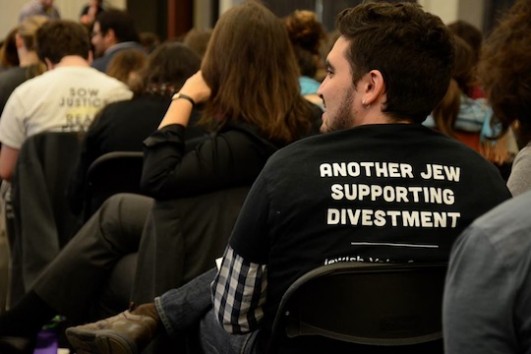The Right to Boycott Is Non-Negotiable
PALESTINE - ISRAEL, 21 Mar 2016
 Regardless of one’s views of BDS, it is ridiculous that one should have to tell self-proclaimed ‘democracies’ that the right to boycott is a basic civil right, not a punishable crime.
Regardless of one’s views of BDS, it is ridiculous that one should have to tell self-proclaimed ‘democracies’ that the right to boycott is a basic civil right, not a punishable crime.
Last week, over 120 people attended a conference in Nazareth on the subject of “BDS (Boycott, Divestment and Sanctions) and ‘48 Palestinians (citizens living inside Israel’s 1948 borders).” Although the discussions were lively, many participants were cautious with their choice of words: Israel’s Anti-Boycott Law – which allows groups and citizens to be sued for calling for a boycott of Israeli institutions, including settlements – cast a heavy shadow over the event.
The anxiety of discussing the subject of boycott would have seemed an implausible scenario a decade ago. Boycotts, we always learned, are a legitimate method of political expression, praised in our history books and modern politics as an example of how nonviolence can be more powerful, moral, and strategic in advancing human rights struggles around the world.
Now, in a corrupt twist, the very countries that purport to uphold civil rights have become the main forces undermining them. In recent months (and years), governments and local authorities in the USA, France, the UK, and others have advanced new laws, administrative decisions, and behind-the-scenes pressures to stem the rising tide of BDS activities – simply because they are being applied against Israel. This transnational counter-movement, as Glenn Greenwald and Andrew Fishman recently detailed in the Intercept, is part of a “very coordinated and well-financed campaign” to censor BDS – and “it is succeeding.”
The political backlash to BDS was always expected; similar attacks by state authorities had targeted the boycott movements in the Jim Crow south and against apartheid South Africa. What is shocking, however, is not only the extent to which authorities are working to crush today’s BDS movement, but the use of legal measures to restrict or fully silence boycott activities against Israel. These include criminal convictions of BDS activists in France; the threat of penalties against local councils in the UK that boycott Israeli goods; and new regulations that will fully incorporate West Bank settlements into the US’s trade with Israel, among others.
The authorities’ manipulation of legal tactics against BDS has severely compromised citizens’ rights. When the Israeli Supreme Court upheld the Anti-Boycott Law last year in a 5-4 ruling, the majority of justices departed from technical arguments and openly endorsed the law’s political goals. One justice wrote that boycott could be a form of “political terror;” another wrote that BDS should stand for “Bigoted, Dishonest and Shameful;” and a third wrote that “There is nothing wrong in anchoring laws passed by the Knesset in the struggle against those who wish to destroy us.” Far from defending freedom of expression, the court willingly gave the green light to deny Israeli citizens a basic tool to challenge the state’s occupation and discriminatory policies.

BDS graffiti on Israeli separation wall, Bethlehem, West Bank, June 17, 2014. (Photo by Ryan Rodrick Beiler/Activestills.org)
These legal crackdowns point to the success of Israel and its supporters in portraying boycott as an immoral act: that to support boycott is to be anti-Israel (and anti-Semitic), and to undermine the advancement of peace. This view, of course, is grossly misguided. Boycotts are supported by Jews too – including inside Israel, where many left-wing academics, artists, and figures have expressed their opposition to working in the settlements. Globally, Jewish groups and activists are among the leading proponents of BDS. Boycott supporters, even Palestinian ones, vary in their preferred targets for boycotts, which can range from specific companies and officials, to settlement products only, to blanket boycotts of the state. Moreover, BDS is arguably the only movement that is altering the conflict’s worsening status quo, at a time when political actors are either deliberately or inadvertently preserving it.
It is true that there are some pro-BDS groups and individuals who abuse their rights for politically ignorant and sometimes racist reasons. But that is hardly the majority of BDS supporters (which itself is a diverse and decentralized movement), and is certainly not a justification for trying to suppress the right to boycott for millions of people, as is now becoming the case. Regardless of one’s views of BDS, it is ridiculous that one should have to tell the governments and courts of self-proclaimed “democracies” that the right to boycott is a non-negotiable civil right, not a punishable crime. If they fail to learn that today, history books will certainly teach it to them in the future.
_________________________________________
Related Stories:
- Interview: The man behind the BDS movement – Rami Younis | June 14, 2015
- No, BDS does not unfairly ‘single out’ Israel – Dahlia Scheindlin | July 13, 2015
- Israel is egging the boycott movement on – Michael Schaeffer, Omer-Man | September 27, 2015
Amjad Iraqi: I am a Palestinian citizen of Israel from Tira and have lived between Israel/Palestine, Kenya and Canada. I work as a projects & international advocacy coordinator at Adalah – The Legal Center for Arab Minority Rights in Israel, based in Haifa. All opinions expressed here are my own.
Join the BDS-BOYCOTT, DIVESTMENT, SANCTIONS campaign to protest the Israeli barbaric siege of Gaza, illegal occupation of the Palestine nation’s territory, the apartheid wall, its inhuman and degrading treatment of the Palestinian people, and the more than 7,000 Palestinian men, women, elderly and children arbitrarily locked up in Israeli prisons.
DON’T BUY PRODUCTS WHOSE BARCODE STARTS WITH 729, which indicates that it is produced in Israel. DO YOUR PART! MAKE A DIFFERENCE!
7 2 9: BOYCOTT FOR JUSTICE!
DISCLAIMER: The statements, views and opinions expressed in pieces republished here are solely those of the authors and do not necessarily represent those of TMS. In accordance with title 17 U.S.C. section 107, this material is distributed without profit to those who have expressed a prior interest in receiving the included information for research and educational purposes. TMS has no affiliation whatsoever with the originator of this article nor is TMS endorsed or sponsored by the originator. “GO TO ORIGINAL” links are provided as a convenience to our readers and allow for verification of authenticity. However, as originating pages are often updated by their originating host sites, the versions posted may not match the versions our readers view when clicking the “GO TO ORIGINAL” links. This site contains copyrighted material the use of which has not always been specifically authorized by the copyright owner. We are making such material available in our efforts to advance understanding of environmental, political, human rights, economic, democracy, scientific, and social justice issues, etc. We believe this constitutes a ‘fair use’ of any such copyrighted material as provided for in section 107 of the US Copyright Law. In accordance with Title 17 U.S.C. Section 107, the material on this site is distributed without profit to those who have expressed a prior interest in receiving the included information for research and educational purposes. For more information go to: http://www.law.cornell.edu/uscode/17/107.shtml. If you wish to use copyrighted material from this site for purposes of your own that go beyond ‘fair use’, you must obtain permission from the copyright owner.
Read more
Click here to go to the current weekly digest or pick another article:
PALESTINE - ISRAEL:
